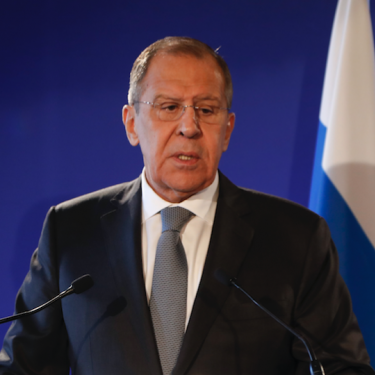Russian foreign minister criticizes RSF’s trustworthy journalism work

Reporters Without Borders (RSF) deplores Russian foreign minister Sergei Lavrov’s criticism of the Journalism Trust Initiative at a time when the defence of trustworthy journalism – meaning journalism that is free, independent and rigorous – is a major challenge for democratic societies and humankind as a whole.
Читать на русском / Read in Russian
Lavrov criticized the Journalism Trust Initiative – which RSF launched in April – at the press conference that he gave jointly with French foreign minister Jean-Yves Le Drian during a visit to Paris yesterday.
“In general, we follow with alarm a number of initiatives that are – not covertly, but publicly – being implemented in the West, including in Europe, initiatives generated by the well-known organization Reporters Without Borders, whose idea is to develop certain journalism trust indicators, white-lists, and so on," Lavrov said.
Possibly alluding to other initiatives, Lavrov added: “The fact that governments in Europe are beginning to support this leads us to the unpleasant conclusion that we are talking of various kinds of political censorship. We would not like to see attempts to moderate international news content on the basis of unilateral political criteria.”
Launched jointly in April by RSF, Agence France-Presse, the European Broadcasting Union and the Global Editors Network, the Journalism Trust Initiative is a designed to be a self-regulatory mechanism that provides positive incentives for all kinds of media, regardless of their status, that practice the best kinds of journalism.
The initial aim is to create an agreed set of indicators for measuring transparency of media ownership, editorial independence, implementation of journalistic methods and respect for journalistic ethics. These standards are being formulated in a joint process carried out under the aegis of the European Centre of Standardization (CEN).
RSF and its partners are asking online platforms, advertisers and others to provide concrete advantages to media outlets that meet these standards – advantages that include preferential treatment by search engine and distribution algorithms leading to better visibility, reach and advertising sales.
“Sergei Lavrov’s completely unfounded criticism of the initiative launched by RSF reflects a form of mistrust of independent and rigorous journalism that respects ethical standards,” RSF secretary-general Christophe Deloire said.
“We point out that the Journalism Trust Initiative aims to create a trusted third party mechanism in which neither governments, platforms nor, obviously, RSF and its partners will get to differentiate between media outlets. Our project is founded on ideals of transparency, independence, implementation of verification methods and respect for professional ethics, and it uses transparent and non-discriminatory mechanisms. It makes no sense to talk of political bias.”
After the JTI project plan’s unanimous adoption on 23 May, nearly 70 organizations met in Paris on 4-5 October to work on the project content. Participants in the process include radio and TV broadcasters such as Radio Télévision Suisse, RTL Group, the German public broadcaster ARD, Radio Canada, the BBC, France Télévision and TV5 Monde; print media such as Gazeta Wyborzca and Der Tagesspiegel; and such news agencies as AFP, EFE, DPA, and TT News.
The participants also include regulatory bodies such as CSA and AGCOM, NGOs that defend press freedom and journalism (Article 19, International Press Institute, Free Press Unlimited and Internews), the Swiss press council, consumer organizations such as ANEC, the Guardian and Thomson foundations and digital experts such as Jeff Jarvis, a professor at the Craig Newmark school of journalism in New York and Scott Yates of the Certified Content Coalition (CableLabs). Russian media outlets have also expressed interest in participating.
The three drafting groups currently formulating the standards are comprised solely of participants who are linked to journalism. A group of new technology experts, the Technical Task Force, is charged with proposing concrete methods for implementing the various criteria. Facebook is also participating in the initiative. The stakeholders group consists of all the other participants, including online platforms and advertisers.



